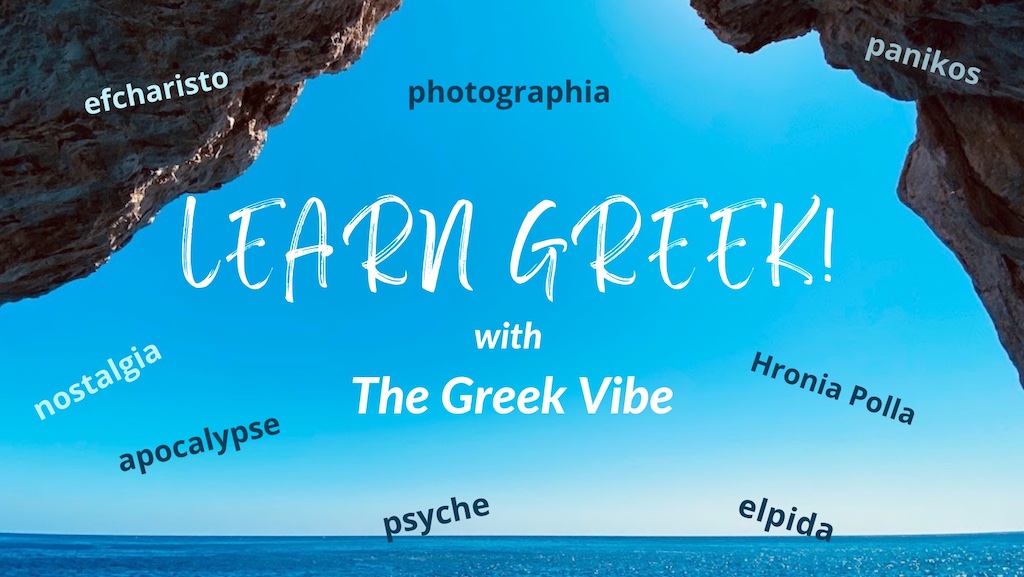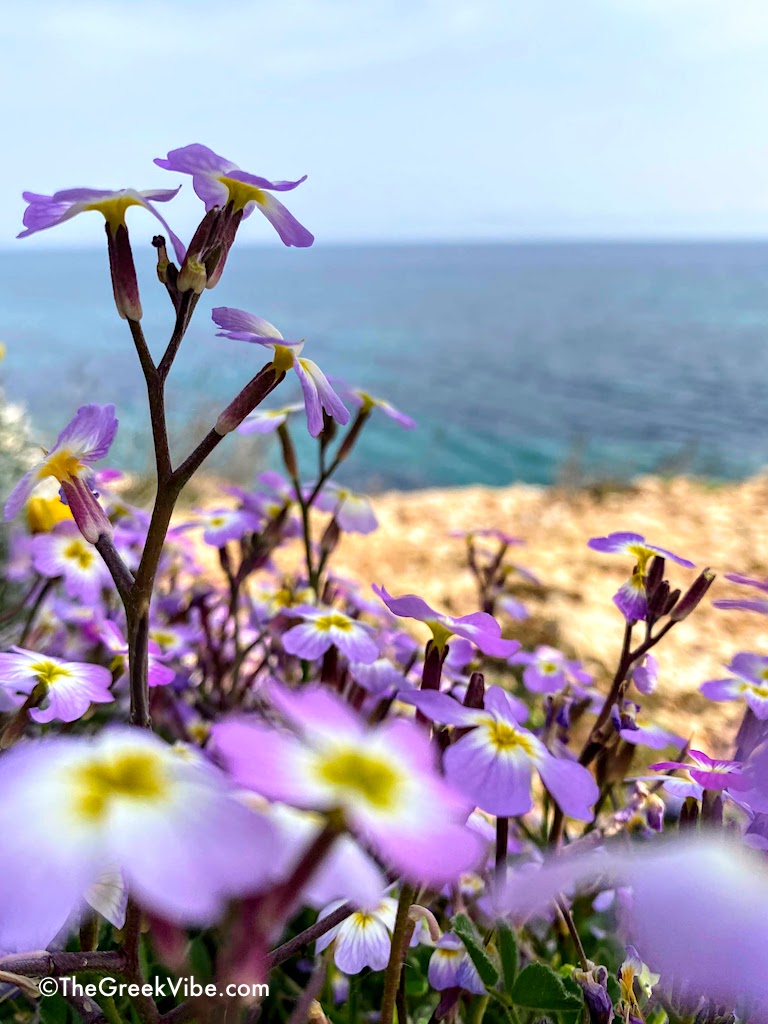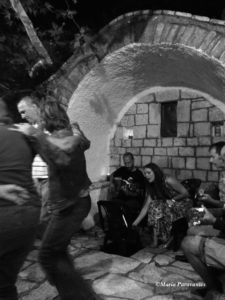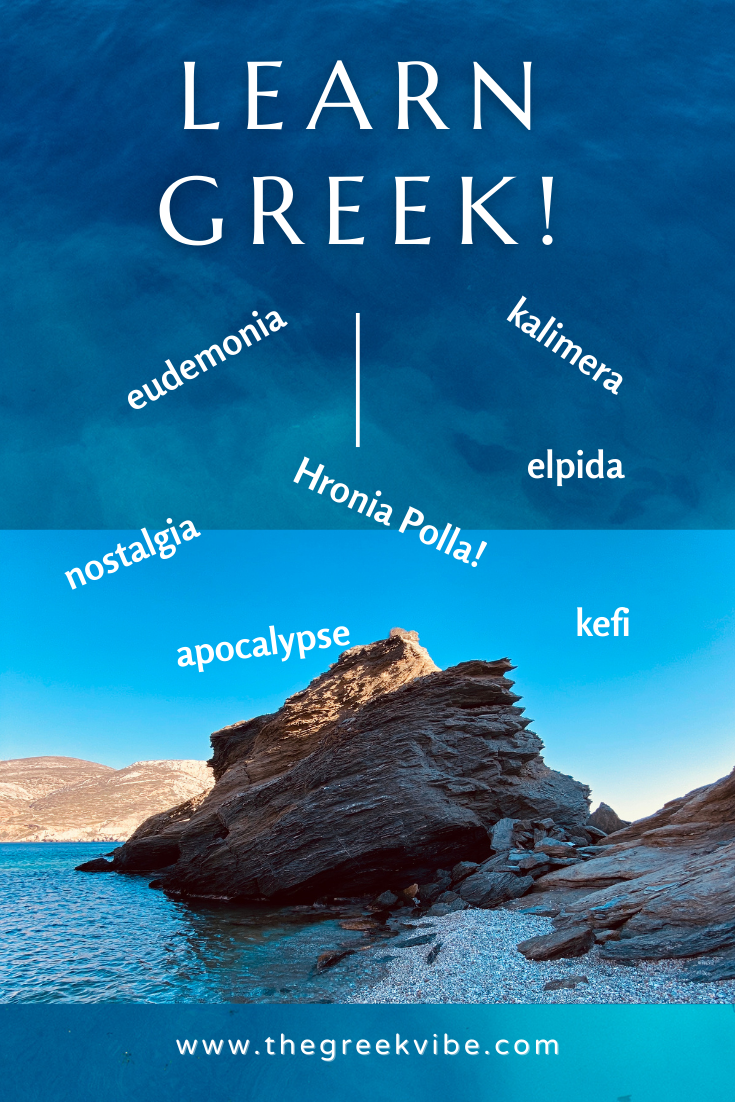
It’s All Greek to Me…
Visit this page at The Greek Vibe to add one more Greek word to your vocabulary. By the time #yournextGreeceadventure begins, you’ll be ready to communicate in Greek!
❤ Greek word of the week: “πανηγύρι” or “panegyri” is a Medieval Greek word derived from the Ancient Greek “πᾰνήγῠρις” (panegyris) made of the prefix “pas or pan” which means “alland everything” and “agyris” from the ancient verb “ageiro”, which means “to gather or assemble” .
Panegyri has come to mean a religious celebration with food and dance in honor of a saint and is also used to express great joy and enthusiasm.
The term today is also used in popular sayings such as “Eimaste gia ta panegyria” which is used negatively to mean that something or someone is ridiculous and not serious.
There is also the phrase “chares kai panegyria” meaning joys and happiness.
There are also several proverbial phrases using the word “panegyria” such as one which translates into: “be frugal in life but in times of joy like the panegyri be generous”
And yes, the English word “panegyric” comes from the Greek “panegyri”
which through time has come to mean “eulogy or praise bestowed on some person or action. In Greek the phrase is “panegyrikos logos” or a special speech addressed to a public gathering.
❤ Δικαιοσύνη” or dikeosyni means “justice” in Greek and is derived from the adjective “dikeos” meaning “fair” which itself comes from the word “diki”. The word “dikeosyni” has many meanings and connotations and was cherished in Ancient Greece but sadly not so in Modern Greece.
So important was the sense of justice and moral responsibility in Ancient Greece that they had a divinity for it: the goddess Dike, who not only symbolized justice and the value of moral order but ensured that those who acted unjustly, paid their dues similar to “karma” we find in Eastern spiritual traditions.
According to Aeschylus, the father of tragedy, the concealed and voiceless Dike constantly observed people and their actions: good or bad.
In Greek, the word “dikeosyni” has legal, ethical, philosophical, social and religious implications. As such, the word can mean the implementation of laws, the abidance and respect of laws, punishment for those who violate the laws and what is morally right, equality and a society with no inequalities, and the sense of moral order and fairness.
❤Ξενοδοχείο or “Xenodocheio” is an ancient Greek word dating back to Homer’s time. The compound consists of the words “xenos” which means “stranger/foreigner” and “docheio” or “place of welcome”. The word is derived according to Greek linguist Georgios Babiniotis from the ancient “xeinodokos” which means to welcome a stranger into your home or what is known today as the law of Greek hospitality. Today’s meaning of the word came about in the Middle Ages and means a place where food and board are offered and charged. In ancient times hotels were known as “pandochia” – buildings which offered food and board. One of Greece’s first hotels was located in Ancient Epidavros next to the theater near the Sanctuary of Asclepius where people seeking a cure would stay.
❤Φιλότιμο or “filotimo” is an ancient Greek word that has intrigued many and been the subject of hundreds of free translations as it is very hard to translate. The compound is made up of the words “filos” (φίλος) which means “friend” and “timi” (τιμή) which means “honor”. Together, the words create “filotimo”, which means a devotion to one’s code of honor. As such, the word “filotmo” embodies several qualities such as honesty, courage, selflessness, benevolence, respect, and wisdom.
Thousands of years ago, Greek philosopher Thales came close to pinpointing it when he said that “filotimo” was like breathing. “A Greek is not a Greek without it. He might as well not be alive at all for that matter.”
The word “filotimo” is also found in Apostle Paul’s writings (epistles) in which he uses it to refer to a refinement of the soul.
In short, “filotimo” is a set of virtues handed down to us by our ancient Greek ancestors. The word initially carried a negative connotation as it implied more “ego-driven” traits such as pride, ambition and zeal. For many, the word “filotimo” is linked to “Greekness” on a collective level. And I wish it was so.
At the end of the day, however, “filotimo” has been mistranslated not so much by the foreigners as by the Greeks themselves, who feel they can use and abuse their fellow compatriots in the name of “filotimo” as in the case of many employers, teams, companies, governments who count on this virtue (not only Greek after all. The Japanese also cherish honor, among others), instead of rewarding devotion, loyalty, sense of duty, and kindness.

❤Γαλαξίας or “Galaxias” is the Greek word for “galaxy”. The Greek word evolved from the words “galax” or “circle” and “gala” which means “milk”. The ancients believed the galaxy and its white gas-like clouds was made of milk or looked very much like milk.
Greek myth has it that Hera, the wife of the King of the Gods, Zeus, was secretly nursing Hercules with divine milk that would make him immortal. When Zeus discovered this, Hera pulled away and her maternal miracle milk spread into the universe. The ancient Greeks believed the galaxy was a mystical path or “way” and the Greek philosophers Plutarch, Anaxagoras and Democritus pondered where this road in the sky could lead.
With this thought in mind, the Romans followed the Greeks and named the galaxy “via lactea” or “road of milk” which was later translated into our very own “Milky Way”. Greeks use a capital -G- to speak of this galaxy – the Milky Way – which includes the Earth, the sun and the known planets, and a lower case -g- when referring to one of the billions of galaxies in the universe.

❤ Καλή όρεξη or “Kali orexi” means “enjoy your meal”. It is a wish made ahead of eating (breakfast, lunch, dinner, snack) and comes from two Ancient Greek words: “kalos” (καλός), which means “beautiful” or “good” and “orexis” (όρεξις), which means “a desire for something”. So when you see someone ready to indulge you wish them “kali orexi”. It is from this Greek word that we have the English “anorexia”, which means a lack of desire to eat.
There is also a saying in Greece that wisely points out that having the desire to do something is usually much more important that the actual “food”: “Kallio kali orexi, para kalo fai” (better have a good appetite rather than good food), which implies the very same thing Greek poet CP Cavafy said about the importance of the journey rather than the destination which is in the end the true meaning of life in his 1911 poem “Ithaca”.
❤ Αρετή or “arete” is an Ancient Greek word that means “virtue” or “virtuous”. Like many Ancient Greek words, “arete” is used by Greek philosophers to cover a wide range of ideal human traits required for one to achieve excellence and reach their fullest potential – the ultimate goal in life. Among others, arete describes charisma, bravery, and sobriety. When used in philosophy it describes someone who has the talent to choose wisely and the courage to remain true to one’s beliefs. In Greek literature and in Homer, heroes employ their “aretes” – many talents and abilities – to achieve the hardest feats and at the same time remain kind and generous. Arete is also used to describe inner beauty. As an adjective, we often use the word “enaretos” to describe “one who is virtuous”. Greek philosopher Socrates said some 3,000 years ago: “Spite is for slaves but arete (virtue) is for the free” and in 1924, Greek poet Andreas Kalvos summed it up nicely: “Freedom demands virtue and courage”. (“Thelei Arete kai Tolmi I Eleftheria”). So very true if we wish to be well in mind and body.

❤ Άνοιξη or Anixi is derived from the ancient Greek work “anoignimi” or “anoigo” which means “to open”. In Modern Greek, we use the Medieval meaning of the word, which means “spring” and which replaces the ancient word for spring “ear” (which you can hear in Byzantine chants). The word “anoixi” symbolizes the “opening” of the weather to better, brighter, warmer days. According to Greek scholar Skarlatos Vyzantios (1798-1878), “spring, not because the sea is open for sail, but because the blossoms open”.
A popular expression in Greece is “Enas koukos (or helidoni) den fernei tin anixi” – literally translated into “one swallow does not bring spring” and loosely translated meaning that efforts of one person alone are never enough for change.
However, I choose to believe in the words of Greek Nobel-prize winning poet Odysseas Elytis, from his poem “To Axion Esti” – “Ena to Helidoni”(One Swallow) in which he says that one swallow is more than enough to mark the coming of spring – a spring of great wonder and meaning.
❤ Πόλεμος or polemos means “war” in Greek. The word goes back to Homer’s time (8th century BC) and is derived from the word “pelemizo”, which means “to scare off the enemy”. The Greek word “polemos” has both negative and positive undertones. In its negative sense it implies discord, strife and friction and hatred for an external enemy. In its positive connotation, it alludes to an inner struggle or fight against “rivals inside” that stand in the way of growth and progress. In this case it refers to overcoming fears and barriers. The ancient Greek philosophers believed “war” in the sense of “violently being kicked out of our comfort zones” was the only way to change and finally to mature, grow and evolve. As Athenian historian and general Thucydides (460-394 BC) put it: “War is a violent teacher”.
❤ Ποίηση or “Pioisi” is the Greek word for “poetry” and is derived from the Ancient Greek “poio” (ποιώ), which means “to create” or “give birth to”. For the Greeks, true creation came from within and led to a higher state of existence and spirit. “Pioisi” also means “self-fulfillment” – achieving our highest potential of our own free will and can also be used to describe a state or quality that is as perfect and harmonious as poetry.
❤ Ακεραιότητα or “Akereotita” means “integrity” in Greek and comes from the Ancient Greek word “akereos”. The word is derived from combining the prefix -a- (which means “without”) and “kera” which means “to destroy” or “that which is not damaged”.
The word “akereos” has several meanings, including to be “untouched, intact, unblemished”, to be “complete, solid, honest, impartial”. It can also mean to be “untainted and moral”. The word has come to mean “whole”.
Greek philosophers Aristotle and Plato referred extensively to “akereotita” in their works highlighting the not only the importance of being “akereos” in mind and actions but mainly on our journey towards wholeness (akereotita), which means veering away from fragmentation: different beliefs, different thoughts and different actions. Ancient Greek philosophy considers being “akereos” a virtue (“arete”).
❤ Λακωνικό or “Lakoniko” is an ancient Greek word which means “to speak or express yourself clearly with short and meaningful words” or to “be concise”. The word derives from Laconia, a region in the Peloponnese, where Sparta is the capital. The Ancient Spartans were known to be austere, disciplined and frugal but were also notorious for their short and to-the-point often stinging remarks. So the word “laconic” came to be used in English to describe someone who is blunt and the word “spartan” to describe something that is basic, without comforts or luxuries.

❤ Φωτογραφία or “Photografia” is the Greek word for “photo” or “photography”. The word is a compound made of the words “fos” which means “light” in Greek and “grafi” which means “to record, to write or to draw”.
There is some confusion as to who used the word first. Some say it was German astronomer Johann von Mädler, others say British polymath (another Greek word) and experimental photographer John Herschel first coined the term in 1839.
And so today we use the Greek-based words photographer, photograph, and photography, to refer to the beloved art. When we want someone to take a photo of us, we ask: “Boreis na me bgaleis photografia?” (Can you take a photo of me?)
❤ Αθλητής or “Athlitis” means “athlete” in Greek and comes from the Ancient Greek verb “athleo or “athlo”, which means to compete, to struggle, to put effort into something, to achieve… and all these meanings came to embody what it is to be an athlete. It is from this Greek word that we have the English “athlete” as well as athletic, athletics, or athletic. In Greek “athlos” also means “achievement” or “feat” as well as “to contend for a prize”. A sport in Greek is an “athlima”. And if you want to say that you work out, you could say “athloume”. In all cases, “athlitismos” involves effort and commitment.

❤ Φιλοδώρημα or “Filodorima” means “to tip” in Greek. The word is derived from the Ancient Greek “filodoros” – a compound word made up of “filos” (friend of) and “doro” (gift) or “friend of gifts” – the gift-giver.
Filodorima is a noun and means to offer a small sum of money to someone for his services. So at a bar, a Greek friend may ask: “filodroima afisame” (Did we leave a tip?). You can also (not as common) use the verb “filodoro” which means to “grant”. In Greece we also use foreign borrowed words (aka loanwords) to mean tip including the French “pourboire” or the Persian “bakseesh”, which can also imply ‘tipping’ in the form of exchange for political favors or bribery.
❤ Σεβασμός or “Sevasmos” means “respect” in Greek. The noun is derived from the Greek Koine (Common Greek) form of the spoken language. The word has multiple meanings: it is a feeling of admiration and reverence of someone or something that is of great value to us. It also means cherishing the truth, adhering to rules and regulations, and upholding individual and collective freedoms by taking full responsibility of our actions. And lastly, “sevasmos” means following -ideally – an inner guidance that demonstrates regard and consideration of all forms of life and all expressions of life.
The verb can be used as in the example: “Sevomai to perivallon.” (I respect the environment.)
❤ Ανάσα or “Anasa” means “breath” in Greek. The noun is derived from the verb “anaseno” or “to breathe”. There are several expressions we use with the word to describe relief or respite: “Pare mia vatheia anasa” (take a deep breath) or even something that is so impressive it takes your breath away (Sou kovei tin anasa).
The word shouldn’t be confused with the similar-sounding “άνασσα” or “Anassa” (stressed on the first -a-) which is an ancient Greek word meaning “queen”. This is why when you visit the Greek islands or villages you’re bound to come across the Panagia Pantanassa (panta = all and anassa = queen) church or monastery dedicated to The Virgin Mary “the Queen of all things”.

❤ Κάλλος or “Kallos” is an Ancient Greek noun which means “beauty” or “grace”. The word, however, has a much wider implication when found in Greek philosophy, and particularly, in the works of Plato and Aristotle. Its broad spectrum of meanings includes anything that has aesthetic or ethical ‘beauty’, in other words it can describe when used as an adjective the magnificence of the mind, the soul, the body, or of things such as sunsets, flowers, art etc.
The adjective – kalo – is used widely in Greek also as a prefix – kal – or – kalo – to describe something that is good or fine. Best examples of this use are “kalokeri” (good+weather) meaning summer, “kalimera” (good+day) meaning good morning, or “kalosyni” which means kindness.
❤ Ψυχή or “psyche” is the Greek word for “soul”. The word comes from the ancient Greek verb “psycho” which literally means “to breathe”. The word is used either to describe a passion one puts into something, courage or ethos and in a more deeper sense refers to the ageless, deathless presence in each one of us. It is also often used to describe generosity and kindness. In ancient Greek, the same word refers to the “butterfly” due to its fleeting presence. The Greeks also had a goddess of the soul named Psyche, of course, and she married Eros, the god of love (aka Cupid).
“Psyche” is used in the very popular Greek phrase” “psyche te kai somati”, which means to “give it your all”, to “put your heart and soul into something”. It is also the prefix in dozens of English words related to the soul or the mind such as psychology, psychic, or psychedelic among others.
❤ Στην υγειά μας or “Stin Ygeia Mas” means “Health to Us” or “health to all” and is what we Greeks say when we make a toast, raise our glasses, clink and drink. We also say “Ygienete”, an ancient Greek verb which means “to be in health“. We often make this wish loudly, firstly in an attempt to ward off any bad energy, and secondly, to make sure that the universe or the greater powers that be are listening and ready to make our wish come true.
❤ Έλευθερία or “eleftheria” means “freedom” or “liberty” in Greek. It is a compound word derived from the ancient Greek “eleftho” which means to “move towards” and “ero /eros” which means “love” – combined they form the word eleftheria which means to move towards that which you love.
In this sense, eleftheria is to have the free will to choose that which brings love to your soulor being free of all attachments that weigh you down. According to the Greek philosophers, you can only be free when you are true to yourself. In Greek philosophy,freedom is driven by the choices you make to create the life you desire. Eleftheria also means the absence of oppression or dependence.
To be free in Greek is to be “eleftheros”
One theory argues that the word “eleftheria” is derived from the prefix “elelef” which was a war cry to the god Zeus and the suffix “thouros” which means forceful or fierce, war together evolving into the word “eleftheros”.
❤ Κοιμάμαι or “koimamai” means “to sleep” in Greek. It’s an ancient Greek verb that describes a condition of no consciousness. The word also means a form of lethargy – another Greek word – ignorance, rest, inertia and death. The English word “cemetery” is derived from the Greek “koimitirion”, which means “place of rest”. It’s not by chance that the Greek Orthodox Church considers death as sleep before the Resurrection. There are many expressions in Greek with the word “koimamai”. One of the most common is “koimasai kai i tyche sou doulevi”, which basically means you’re not doing much but luck is on your side.

❤ Μεράκι or “Meraki” means a “passion” or a “committed drive” for something. In short, I would say it’s what we feel when we love what we are doing and time stops. It’s a deep unconditional love for a hobby, an interest, a sport, that brings fulfillment and joy. The word “meraki” is very important for the Greeks and for Greek culture overall.
The origin of the word appears to be either a loan word from the Turkish “merak” derived from the Persian “meraqq” meaning “to worry” – and that’s how it is used in Turkish. Or from the Serbian word “merak”, which describes a feeling of bliss attained from life’s simple pleasures. Some say the word is derived from the ancient Greek “imeros” which means an erotic passion. Similar words can be found across the Balkans.
In Greece, we call a person who puts great care and love into what he does a “meraklis” and this is considered a compliment, even greater than saying that someone is talented.
❤ Τύχη or “tyche” means “luck” in Greek, or more specifically, a power that can affect the outcome of something towards a positive direction.
The Greeks even had a goddess of luck, fate and providence: her name “Tyche”, who was the daughter of the goddess of beauty and love, Aphrodite and Zeus.
For the Romans her name was “Fortuna” from which we have the word “fortune”.
“Tyche” is also part of the compound Greek word “ef-tychia”… which means “happiness” or in other words “to be in good fortune”. Four popular phrases in Greek using the word “tyche” are: “anigi I tyche mou” which means “I am on a string of good luck” / “afino ta pragmata sti tyche tous”, which means that I leave things to fate without interfering /“Eho tin tyche me to meros mou” or I have luck on my side” and lastly, “tyche vouno” which means to have a “mountain of luck”!

❤ Πανικός or “panikos” means “panic”. The word is ancient Greek and means a freezing fear, an extreme sense of terror and dread. The word is actually derived from a reference to Greek god Pan, half man half goat. Pan was the god of nature, the woods, the wild, the flocks, and the mountain, and is often associated with fertility and sexuality.
The mischievous god was known for creating mysterious sounds as he roamed the woods of Arcadia that would cause sudden fear among animals or people.
When well, Pan loved playing the flute but when he was angry or upset, he would let out a petrifying scream that created morbid fear. One such story tells a tale of Pan letting out an immense cry during the Battle of Marathon between the Greeks and the Persians. So terrifying was the sound that the enemy fled. In Greek we say “me epiase panikos” or “panikovalome” to mean “I am in a state of panic”.
❤ Καλά Χριστούγεννα or “Kala Christougenna” is the wish Greeks make on Christmas. The phrase is made up of the word “kala” which means good or fine and the compound word “Christou” which means “Christ” and “genna” which means “birth”. It is believed that the commonly used abbreviation “Χmas” is derived from the Greek letter -Χ– which is the first letter of “Χριστός” or Christ and “Mas” which means “mass” in old English. On Christmas Eve and on Christmas, we wish friends and family Kala Christougenna and also add Hronia Polla, which is a wish of “Many Years of Health and Prosperity”.

❤ Ευδαιμονία or “eudemonia” is a state of mind that creates happiness, contentment and prosperity. It could freely be translated as “bliss”. The ancient Greek word is made up of the suffix –eu– which means “good” and -“daimon”- which means “demon”. So if you’ve managed to locate your “kind demon” then you lead a happy fulfilling life.
The word, or rather the concept of eudemonia has been explored for centuries starting with Socrates and Plato, the Stoics and Sceptics, the Cynics and Epicureans.
Greek philosopher Aristotle believed achieving eudemonia was the sole purpose of one’s life.
In my view, eudemonia is achieved every single day when we can accept all things with gratitude as is implied by the adjective “eudeos”, which means to be in awe and wonderment.
❤ Υπομονή or “ipomoni” means to have “patience” in Greek. The word has the same meaning as it did in ancient Greece, and is made up of the suffix “ipo” or “under” and “meno” which means “to stand” – literally meaning someone who remains firm and committed to his position or stance despite what’s happening around them. It also means “not in any hurry“, “tolerance” and “accepting a situation with no complaints or grudges”. Greek philosopher Plato born in 427 BC believed that patience (ipomoni) was the foundation of wisdom.

❤ Φθινόπωρο or “fthinoporo” means “fall” or “autumn” in Greek. The ancient Greek compound word dates back to the 5th century BC and is made up of the words “fthino”, which means to lessen or decrease, and “opora”, which means fruit. In short, it is the period of the year when our access to fruit and vegetables declines. During this season however, Greeks produce their wines and famed olive oil. After the last summer swim, Greeks wish each other “Kalo Fthinoporo” or “a good autumn season”.
❤ Ελπίδα or “elpida” means “hope” or the anticipation (or as a negative connotation “expectation”) that something better will come along. The ancient Greek word “elpis” is derived from myth where Elpis – a young girl carrying flowers – was the spirit of hope and abundance. According to myth, Elpida (hope) was the only thing left in Pandora’s Box after Pandora opened it and unknowingly released all evils into the world. This however has created controversy: is hope a good thing, signifying acceptance and a comforting thought? Or is it bad, representing expectations that others will be responsible for any change we wish to see. In Greek Orthodox texts, Elpida is the daughter – together with Pisti (Faith) and Agapi (Love) – of Saint Sophia (Wisdom) – all four celebrated on September 17. There is also a saying among the Greeks that “elpida (hope) dies last”. Elpida today is also a popular girl’s name.
❤ Θεός or “theos” means “god” in Greek. The Greek philosopher Plato believed the word came from the ancient Greek verb “thein” (θέειν) which means “in circular motion” as were the sun and the planets that revolve and return to themselves. This is of course only one of the many explanations of the word. Another theory has it that the word “theos” comes from the verb “theomai” which means “to see all” or from the verb “theo” which means “omnipresent”. We can use its adjective “theiko” to describe something that is divine.
❤ Ραστώνη or “rastoni” is a beautiful Greek word expressing how time passes during a lazy summer day. It’s more of a feeling of repose and is best conveyed in the famous jazz tune “Summertime… and the livin’ is easy…”. The word is ancient Greek and literally means stopping all activity – just like “diakopes” which means “vacation”. We’ve all feel it when we stretch out on a beach or at home with the windows open taking a nap here and there practicing the absolute art of doing nothing.
❤ Έξω καρδιά or “Exo Kardia” literally means “open hearted”, outgoing, carefree, and fun to be with. It’s very much the same with the word “anoichtokardos”. The term is used to describe someone who is most likely the life of the party. It also refers to a person who doesn’t take things “to heart” (or “katakarda”) and remains unattached and optimistic.
❤ Παρέα or “parea” means to be “in the company of friends” or to do something “together”. “Parea” is a loan word from the Spanish “pareja”, which means “partner”. In Greece, when we refer to our “parea”, we’re referring to our closest friends – ‘partners in crime’, one could lovingly say. The word is commonly used and is an integral part of Greek life and culture as everything Greeks do usually involve a “parea”. The word can become a compound depending on the word added: for instance: “trello-parea” (crazy group of friends); “gynaiko-parea” (women-only), “antro-parea” (men-only). The “parea” is of such importance to the Greeks that we even have a song praising it: Dionysis Savvopoulos says in one of his 1983 songs: “parees make history”. True indeed! It’s always about sharing.

❤ Ήλιος or “elios” means “sun” in Greek. The Greeks also had a sun god named Helios, derived from the Homeric word for sun – helius – and which is also the base word for the chemical gas known as “helium”.
In Greek mythology, the Sun god drove his horse-drawn chariot through the sky every day at dawn and dusk “pulling in and out the rays of light”
The son of Titans, Helios was the brother of the goddesses Selene (the Moon) and Eos (the dawn).
In Plato’s work “The Republic”, “elios” referred to as “alios”, alludes to the one who rises bringing the light to one and all, uniting all humans under the sun. He believed – like many spiritual teachers who followed – that one ray of light can disperse all darkness as it “sheds light” on knowledge so that we can see access true reality with the “mind’s eye“. Socrates, his teacher, referred to sun as the “child of goodness” as it illuminates the truth.
❤ Νοσταλγία or “Nostalgia” reflects an inner longing for one’s homeland. A common word among the Greeks who emigrated, “nostalgia” is a compound word derived from joining of the ancient Greek words “nostos” which means “return or homecoming” and “algos” which means “pain or grief”. The term “nostalgia” was actually used in the late 1600s to describe a medical condition where one became obsessed (and depressed) to the point of illness (some times fatally), plagued by bittersweet memories of one’s homeland and the inability to return. It later came to represent the same feeling: a yearning for the return to a loved one or to a pleasant situation, particularly to carefree childhood.

❤ Καλοκαίρι or “kalokeri” means “summer” and is a Medieval compound word derived from the ancient Greek words “kalo” which means “good” and “kairos” which means “season” or “time” and which came to mean summertime… when the living is easy. The ancient Greek word for summer is the word “theros” that’s why we say “therino cinema” referring to open-air summer cinemas. Kalo Kalokairi to all!
❤ Αρμονία or “armonia” means “harmony” and is derived from the verb “aro” which is the root for the Greek word “areti” or “virtue”. “Armonia” therefore is a virtue in that it brings all things together to create a healthy whole: a oneness. This “whole” or “unity” means to be in tune and in union with the source – the universal laws . In Greek mythology, Harmonia was a deity – the daughter of two gods: Ares (of war) and Aphrodite (of love).
❤ Καλημέρα – or “Kalimera” literally means “good day” – καλή = good and μέρα = day. We use it mainly in the mornings to wish the others good morning.
❤ Ευχαριστώ or “Efharisto” means “thank you” – ευ = good and χάρις = blessing. I suggest using it to others and to yourselves. It creates a better world. In the Christian sense, Efcharist, was used by Jesus in the Last Supper as he offered bread to his disciples expressing thanks and gratitude for that day.
❤ Χρόνια Πολλά or “Hronia Polla” which literally means “Many Years (of Health to You)”. The wish is used on all holidays, birthdays, and namedays. However, according to Greek Orthodox tradition, for the wish of “Hronia Polla” to mean something more it must be accompanied by a specific reason, which this week is “Καλά Χριστούγεννα” (Kala Christougenna) – meaning Merry Christmas!

❤ Καλή Χρονιά or “Kali Hronia” literally means “Good Year”. Greeks say “Kali Xronia” at the start of the new year extending wishes of a yeαr full of health, love and prosperity. It is believed that wishes for the new year are meant to inspire and to motivate; a good word for the celebration of a new chance to be better versions of ourselves, as well as positive energy from one to the other. This said, ‘Kali Hronia’ to all of you filled with Love, Kindness, and Compassion.
❤ Γλυκό του κουταλιού or “glyko to koutaliou” literally means “spoon sweet”, which was a very popular treats (kerasma) in the ’50s, ’60s and ’70s. This was mainly because they could keep for months without needing to be refrigerated. As of late, the traditional Greek spoon sweet has made a strong comeback as it is a healthier choice for those midnight cravings.
❤ Φιλοξενία or “Filoxenia” means “hospitality” in Greek – literally broken down to mean “friend” (filos) of the “foreigner” (xenos). Extending hospitality to the traveler or stranger has been among the top virtues in Greek culture ever since antiquity. There are dozens of myths dedicated to the art of hospitality telling the tales of humble wanderers seeking shelter and food who were actually gods in disguise.
❤ Καλό μήνα or “Kalo Mina” means “Good Month” in Greek. It is actually a wish and a blessing which we share with loved ones and friends at the start of each month.
❤ Αγάπη or “agape” vs “Έρωτας” or “erotas” – Two words very much tied with the mood of the week. Agape is the unconditional love for someone or for the divine. Erotas or “eros” is a form of intimate love accompanied by all that entails: passion, sex, pleasure and it is from this that have the word “erotic”. Happy Valentine’s Day to all. In Greece, Agios Yakinthos is the saint that protects the enamored or those “in love” celebrated on July 3.
❤ Ευχαριστώ or “efcharisto” means “thank you” and is used to express gratitude. The word is derived from “eu” + “charis” which literally mean “in the favor of grace”. It is from this word that we have “Eucharist” which in the Catholic tradition refers to Holy Communion – an action of thanksgiving to God. Additionally, we accent “echaristo” at the end, but if you place the accent on the -a- Efchάristo – then the word means pleasant.

❤ Διακοπές or “Diakopes” means “vacation” in Greek. It is actually the plural of the verb “diakopto” which means “stopping something” or “interrupting”. And that’s exactly what “diakopes” is all about: interrupting whatever you do all year round, and doing something different.
❤ Θάλασσα or “Thalassa“ means “sea” and is an ancient Greek word used over thousands of years with the very same meaning. A phrase we Greeks love and I know you will too? “Pame thalassa!”, or “Let’s hit the beach”.
❤ Υγεία or “hygieia” means “health of both body and mind” or the “absence of illness”. It is from this word that we have the word “hygiene”. In ancient Greek mythology, Hygieia was the goddess of good health. Her father was god of medicine, Asclepius.
❤ Άνοιξη or “Anixi” from the ancient Greek word “anixis” which means “to open”. In the Middle Ages, the word evolved to mean “spring” replacing “ear” and symbolizing the “opening” or improved weather and the “opening” of the flowers. Let’s add to that: the opening of our hearts. Kalo Mina! Kali Anixi!
❤ Ανάσταση or “Anastasi” comes from the Ancient Greek word which means “to rise”, “to emerge” or “to shift”. The word today means “resurrection” and denotes an inner shift toward a higher “arisen” (awakened) state. Greek Easter culminates with the resurrection of Christ and that is why we wish each other “Kali Anastasi” so that we may all follow His example and reach our highest spiritual state.
❤ Κέφι or “Kefi” describes a state of the mind, a situation in which you feel passionate about something, it can describe a good mood or even the sense of euphoria (another Greek word) as a result of doing something fun and fulfilling. In Zorba the Greek – a novel by Nikos Kazantzakis – the lead character Zorbas best embodies the notion of “kefi”. To put it simply, ‘succumbing to kefi’ is putting your heart and soul’s best interest first. It’s doing what makes you feel in sync, in balance, in the here and now.


One Greek word I struggle to translate or to convey the meaning is the word
φιλότιμο “filotimo”. Is there an English equivalent.
Emily, thank you for pointing that out. Indeed there are certain Greek words as in all cultures that cannot be translated exactly. I will add “filotimo” this week to The Greek Vibe’s Learn Greek section. Overall, “filotimo” is a selfless action done out of a personal “code of honor” and free will. Stay tuned!
More here
I love words. Especially greek words.
Enjoyed reading the above.
Thank you.
My pleasure. All languages have beauty. Stay tuned.
The most commonly used word in the Greek language is “Malakas”. When I first visited the islands, I thought every Greek guy was named Manoli or Malakas. Google translates malakas to meaning ‘soft’.
It is true Emily that you’re bound to hear the word often. Although it is a swear word, it is more often used ‘lovingly’ among friends, particularly teenage boys aiming through curse-words to reach manhood.